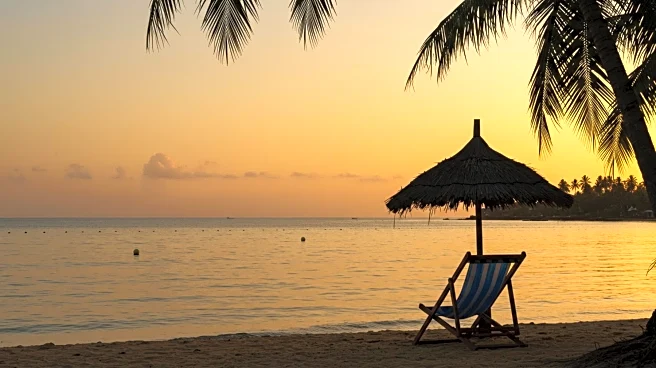What is the story about?
What's Happening?
North Korea has opened the Wonsan Kalma Coastal Tourist Zone, a new resort on its east coast, primarily to Russian tourists. The resort, which features hotels, restaurants, shopping malls, and a water park, is located near a missile testing site. Despite initial plans to welcome international tourists, only Russians have been allowed entry, organized by accredited travel agencies. The resort's opening comes after North Korea eased travel restrictions, which had been in place to prevent the spread of COVID-19. However, the country has abruptly halted visits from Western tourists, including those from Australia, France, Germany, and the UK, without providing reasons. The resort is part of Kim Jong Un's strategy to boost tourism, inspired by Spain's Benidorm, but its construction has faced criticism over alleged forced labor and harsh working conditions.
Why It's Important?
The development of the Wonsan Kalma resort is significant as it represents North Korea's attempt to revitalize its economy through tourism. By limiting access primarily to Russian tourists, North Korea is strengthening its ties with Russia, a key ally. This move could have implications for international relations, as it may affect North Korea's diplomatic stance and economic partnerships. The resort's construction has raised human rights concerns, highlighting issues of forced labor and inadequate compensation, which could impact North Korea's international reputation. The selective opening of the resort also reflects North Korea's cautious approach to foreign influence, aiming to prevent its citizens from unfavorable comparisons with wealthier foreigners.
What's Next?
The future of tourism at Wonsan Kalma remains uncertain, with North Korean authorities yet to approve further tours for Russian visitors. Interest in potential tours is high, but the country's restrictive policies may limit access. The resort's success in attracting tourists could influence North Korea's economic strategies and its approach to international tourism. Additionally, the ongoing human rights concerns may prompt further scrutiny from international organizations, potentially affecting North Korea's diplomatic relations. The resort's development could also lead to increased collaboration with Russia, impacting geopolitical dynamics in the region.
Beyond the Headlines
The opening of Wonsan Kalma highlights the ethical and human rights issues associated with North Korea's development projects. The use of forced labor and harsh working conditions raises questions about the country's labor practices and the treatment of its citizens. The resort's construction and operation may also reflect broader cultural and societal dynamics within North Korea, as the government seeks to control foreign influence and maintain its ideological narrative. The selective tourism policy underscores North Korea's strategic approach to international engagement, balancing economic needs with political considerations.















